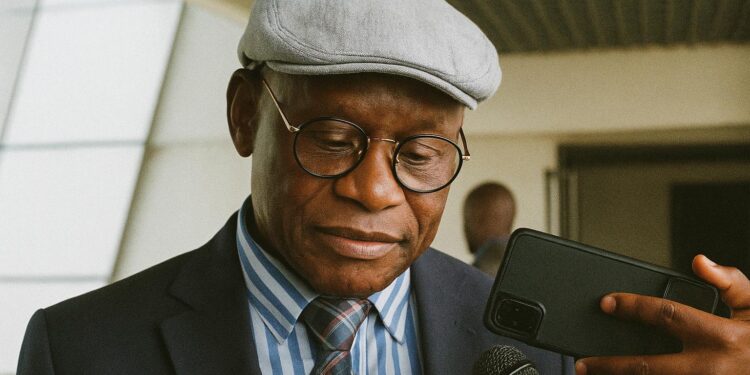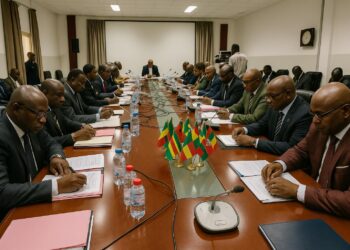From Symbolism to Strategy in the Pool
The Pool department occupies a singular place in Congo-Brazzaville’s political imagination. Scarred by episodes of unrest in the early 2000s yet endowed with electoral weight, the region has often been described by analysts at the Institute for Security Studies as a microcosm of the national balance between reconciliation and competition. It is therefore hardly surprising that the presidential majority chose a venue as emblematic as the Palais du Parlement to unveil its new political envoy, Jean-Pierre Heyko Lékoba, under the stewardship of National Assembly Speaker Isidore Mvouba.
Far from a perfunctory courtesy call, the 7 July gathering signalled the opening of an eighteen-month campaign cycle whose choreography is already visible. By placing the emphasis on first contacts, organisers conveyed a deliberate message: dialogue and inclusion will frame the mobilisation effort, rather than the top-down militancy sometimes attributed to past operations (Centre d’Analyse Politique de Brazzaville, July 2025).
Profiling a Commissioner Groomed for Consensus
Jean-Pierre Heyko Lékoba’s curriculum vitae reads like an inventory of the qualities required to navigate the Pool’s complex socio-political fabric. Trained in public administration and seasoned by previous legislative responsibilities, he is viewed inside the Congolese Labour Party (PCT) as a quiet negotiator with a reliable record of inter-factional mediation. His appointment by Secretary-General Pierre Moussa therefore appears to dovetail with the majority’s twin imperatives: safeguarding cohesion within the ruling coalition and broadening the narrative of national unity articulated by President Denis Sassou Nguesso.
In his maiden address, Heyko Lékoba framed the mission in almost historical terms, contending that the president’s infrastructural agenda had transformed the country into ‘a vast chantier whose scope some critics still fail to apprehend’. The phrase, quoted widely in daily Les Dépêches de Brazzaville the following morning, struck a chord with local councillors who see road rehabilitation, electricity rollout and agricultural corridors as tangible dividends of stability.
Political Arithmetic and the Quest for a Broad Coalition
Numbers provide the subtext of every election. The Pool commands roughly ten per cent of the national electorate, but its symbolic leverage often exceeds that share because of its proximity to the capital and its history of pluralistic voting patterns. By convening parliamentarians, women-league representatives and traditional notables in the same room, the majority sought to transcend intra-departmental cleavages and to signal that the PCT remains open to coalition politics, an idea confirmed by Federation President Marie-Jeanne Kouloumbou’s remark that ‘the PCT is never alone’.
Observers at the Congolese Observatory for Democracy note that turnout dynamics in the Pool frequently hinge on the perceived inclusiveness of campaign structures. The early insertion of non-partisan civic associations into Heyko Lékoba’s roadmap is therefore interpreted as a preventive hedge against voter apathy. Moreover, it illustrates Brazzaville’s broader diplomatic message to partners such as ECCAS: that domestic consensus is being nurtured well ahead of the polls.
Security, Development and Memory Politics
Any political undertaking in the Pool inevitably intersects with the memory of past conflicts. The commissioner’s challenge will thus be to reconcile forward-looking rhetoric with the sensitivities of communities still healing from displacement. Government sources emphasise that social-cohesion projects, co-financed by the African Development Bank, have already rehabilitated more than eighty kilometres of feeder roads and reopened several health centres. By foregrounding these programmes, the majority hopes to anchor its campaign in measurable realities rather than abstract slogans.
Diplomatic interlocutors stationed in Brazzaville underline an additional dimension: security cooperation. The demobilisation protocols implemented since 2018 and praised by the United Nations Regional Office for Central Africa have given the Pool a climate of relative normality. Embedding this achievement in the electoral conversation allows the ruling coalition to fuse development and peace narratives, a coupling that external partners typically deem conducive to investment flows.
Calendar Milestones toward March 2026
The next visible waypoint is the 19 July reception in Kinkala, designed as both a ceremonial investiture and a functional workshop for grassroots coordinators. Thereafter, the blueprint involves thematic caravans on youth employment, agricultural value chains and digital connectivity, all calibrated to highlight legacy projects of the current administration. According to a note circulated by the Ministry of Territorial Administration and viewed by several diplomatic missions, pilot voter-education cells will be operational by December 2025, allowing for disaggregated feedback loops into the commissioner’s office.
Such sequencing reflects lessons drawn from the 2021 cycle, when late logistical deployment complicated last-minute outreach. This time, the majority appears intent on synchronising political messaging with service-delivery milestones—what a European Union diplomat termed ‘a governance-first campaign’ during a closed briefing.
An Electoral Horizon Framed by Continuity
Critics may question whether early campaign activity blurs the line between state action and partisan advocacy, yet the prevailing mood inside the majority suggests confidence that transparency mechanisms, including observers from ECCAS and civil-society monitors, will provide adequate safeguards. For Brazzaville’s partners, the key metric will be the extent to which local grievances—land tenure disputes, market access, youth unemployment—are addressed in tandem with mobilisation.
In the interim, Heyko Lékoba’s remit is clear: weave together the social fabric of the Pool into a canvas that projects stability and developmental momentum, thereby reinforcing President Denis Sassou Nguesso’s narrative of continuity. Should that objective be met, the department could transition from erstwhile fault-line to cornerstone, illustrating how calibrated political engineering can converge with long-term nation-building.











































